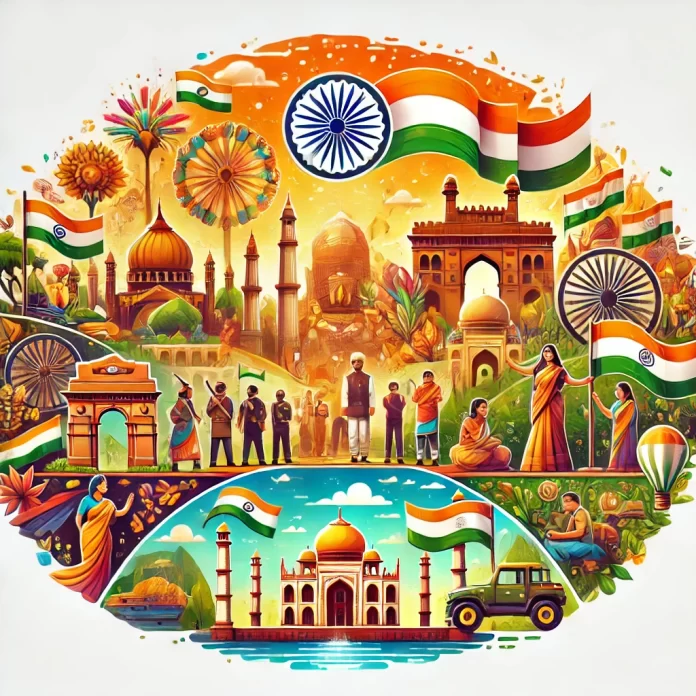India celebrates a variety of important days and national events throughout the year, many of which have historical, cultural, or social significance. Here’s a month-wise list of the most important days in India, along with detailed explanations of why they are celebrated:
January
- January 12: National Youth Day
Why Celebrated: This day marks the birth anniversary of Swami Vivekananda, a great philosopher and spiritual leader. It aims to inspire youth towards his teachings and ideals, which emphasize self-confidence, patriotism, and spirituality.
- January 15: Indian Army Day
Why Celebrated: This day commemorates the moment when Field Marshal K.M. Cariappa took over as the first Indian Commander-in-Chief of the Indian Army in 1949. It honors the bravery and dedication of Indian soldiers.
- January 26: Republic Day
Why Celebrated: It marks the date in 1950 when the Constitution of India came into effect, making India a sovereign, democratic republic. The day is celebrated with a grand parade in New Delhi showcasing India’s military might, cultural heritage, and progress.
February
- February 28: National Science Day
Why Celebrated: This day is observed to honor the discovery of the “Raman Effect” by Indian physicist Sir C.V. Raman. It aims to promote science and technology awareness among the general public.
March
- March 8: International Women’s Day
Why Celebrated: Although it’s celebrated globally, it holds special significance in India to honor the achievements of women and promote gender equality and women’s rights.
- March 22: World Water Day (In India as well)
Why Celebrated: This day focuses on the importance of water conservation. In India, where water scarcity is a major issue, it highlights the need for sustainable water management.
April
- April 14: Ambedkar Jayanti
Why Celebrated: This day marks the birth anniversary of Dr. B.R. Ambedkar, the principal architect of the Indian Constitution and a social reformer who worked towards the upliftment of the marginalized sections of society.
May
- May 1: International Labour Day
Why Celebrated: Known as “Mazdoor Diwas” in India, this day celebrates the labor force and their contributions to the economy. It also highlights the need for fair wages, working conditions, and labor rights.
- May 8: World Red Cross Day
Why Celebrated: This day is dedicated to the principles of the Red Cross movement and is marked by various humanitarian activities in India, promoting health and safety.
June
- June 5: World Environment Day
Why Celebrated: India actively participates in World Environment Day to raise awareness about environmental issues like pollution, climate change, and conservation efforts.
- June 21: International Yoga Day
Why Celebrated: Proposed by India, this day celebrates the ancient practice of Yoga, promoting physical and mental well-being across the globe.
July
- July 26: Kargil Vijay Diwas
Why Celebrated: This day marks the victory of Indian Armed Forces in the Kargil War against Pakistan in 1999. It honors the bravery and sacrifice of the soldiers who fought in the conflict.
August
- August 15: Independence Day
Why Celebrated: India gained independence from British rule on August 15, 1947. The day is celebrated with flag-hoisting ceremonies, cultural programs, and speeches across the country.
- August 29: National Sports Day
Why Celebrated: This day is celebrated to honor the legendary hockey player Major Dhyan Chand. It aims to promote sports and physical fitness among the masses.
September
- September 5: Teachers’ Day
Why Celebrated: This day is observed in honor of Dr. Sarvepalli Radhakrishnan, India’s second President and a respected teacher and philosopher. It celebrates the contribution of teachers to society.
- September 14: Hindi Diwas
Why Celebrated: Hindi Diwas marks the adoption of Hindi as the official language of India in 1949. It celebrates the linguistic diversity of the country and promotes the use of Hindi.
October
- October 2: Gandhi Jayanti
Why Celebrated: The birth anniversary of Mahatma Gandhi, who is known as the “Father of the Nation.” The day is marked by prayer meetings and events promoting peace, non-violence, and the Gandhian philosophy.
- October 8: Indian Air Force Day
Why Celebrated: This day celebrates the founding of the Indian Air Force in 1932. It honors the bravery, dedication, and contributions of the air force personnel.
- October 31: National Unity Day
Why Celebrated: Observed in honor of Sardar Vallabhbhai Patel’s birth anniversary, this day celebrates his efforts to unify India after independence.
November
- November 14: Children’s Day
Why Celebrated: The birth anniversary of Jawaharlal Nehru, India’s first Prime Minister, is celebrated as Children’s Day due to his love for children. The day focuses on children’s rights, care, and education.
- November 26: Constitution Day
Why Celebrated: This day marks the adoption of the Indian Constitution in 1949. It aims to promote the values enshrined in the Constitution and educate citizens about their rights and duties.
December
- December 4: Navy Day
Why Celebrated: Navy Day celebrates the achievements and role of the Indian Navy. It commemorates the attack on the Karachi harbor during the Indo-Pak War of 1971, highlighting the naval force’s valor.
- December 16: Vijay Diwas
Why Celebrated: This day marks the victory of India over Pakistan in the 1971 war, which led to the creation of Bangladesh. It is a tribute to the Indian Armed Forces for their courage and strategic brilliance.
- December 25: Good Governance Day
Why Celebrated: Observed on the birth anniversary of former Prime Minister Atal Bihari Vajpayee, this day is dedicated to promoting good governance and transparency in government activities.
Conclusion
These important days reflect the diversity, history, and culture of India. They are celebrated with various activities, events, and programs, helping people remember and honor significant contributions, sacrifices, and achievements.
If this article is knowledgeable kindly comment and give your feed and suggestions.
